牛津译林版八年级上册Unit 8 Natural disasters 第5课时教学课件(共26张PPT,内嵌音频)
文档属性
| 名称 | 牛津译林版八年级上册Unit 8 Natural disasters 第5课时教学课件(共26张PPT,内嵌音频) | 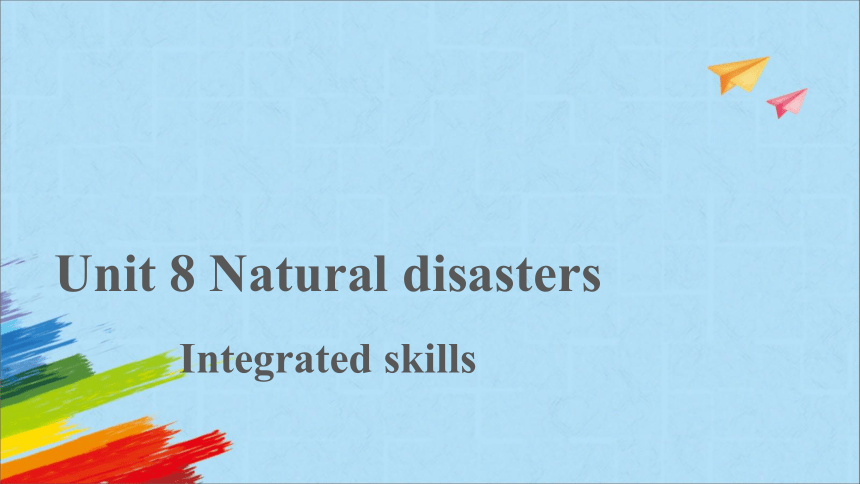 | |
| 格式 | pptx | ||
| 文件大小 | 4.7MB | ||
| 资源类型 | 教案 | ||
| 版本资源 | 牛津译林版 | ||
| 科目 | 英语 | ||
| 更新时间 | 2022-10-22 23:02:41 | ||
图片预览

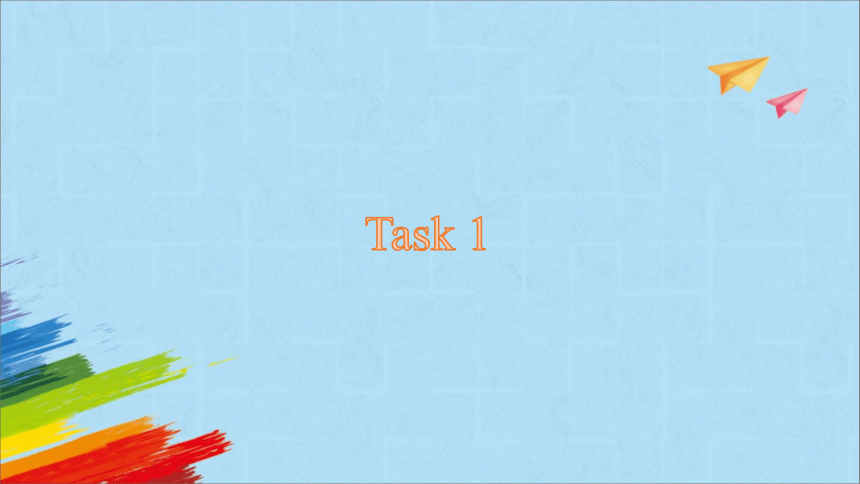
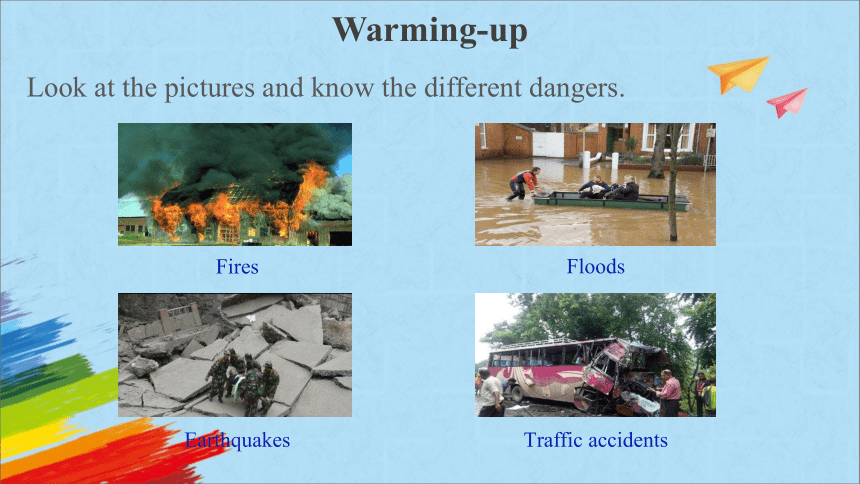
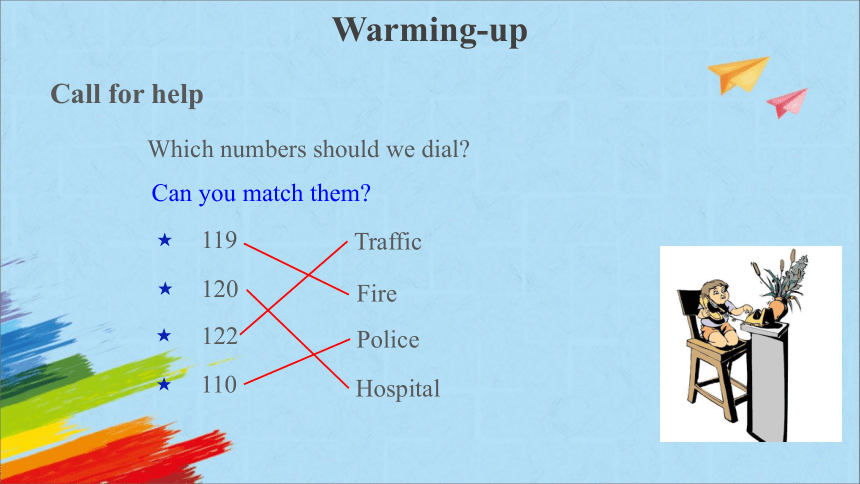
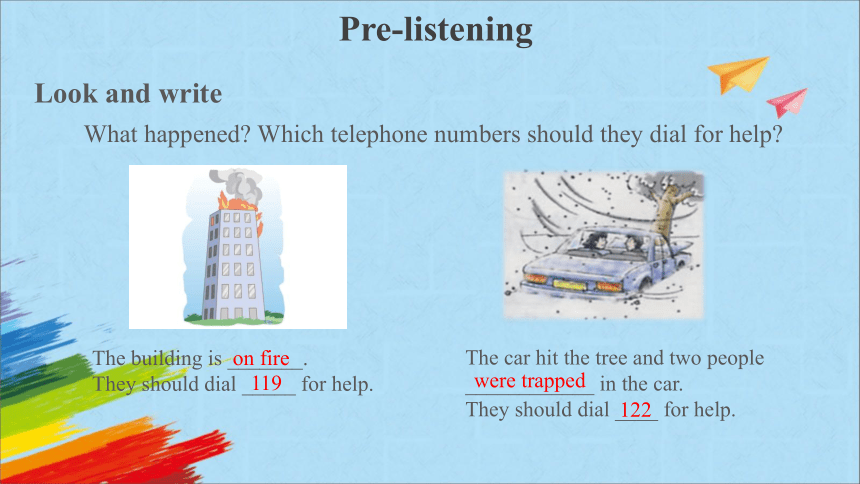
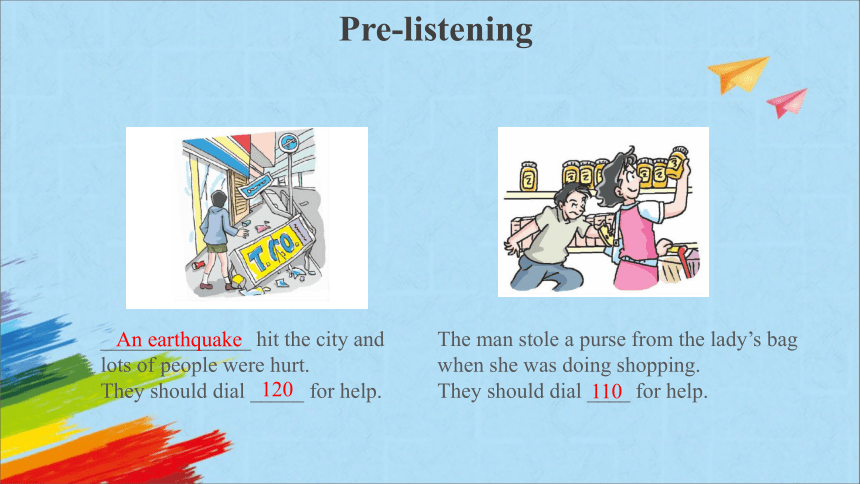
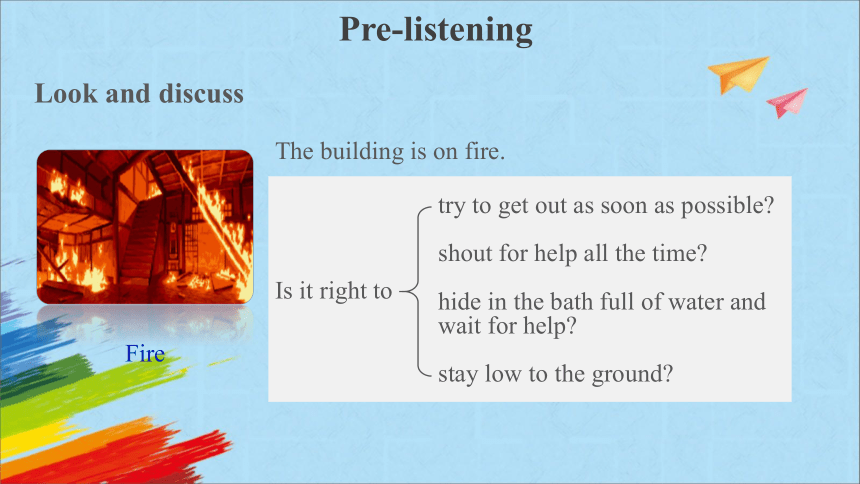
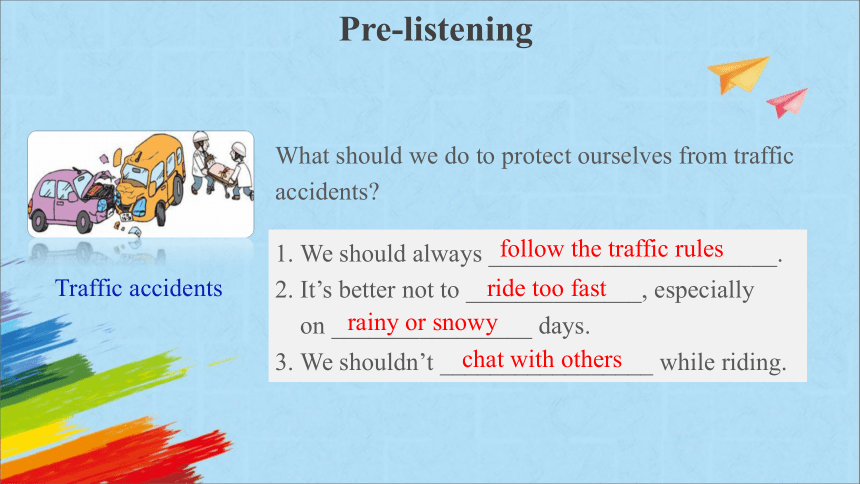
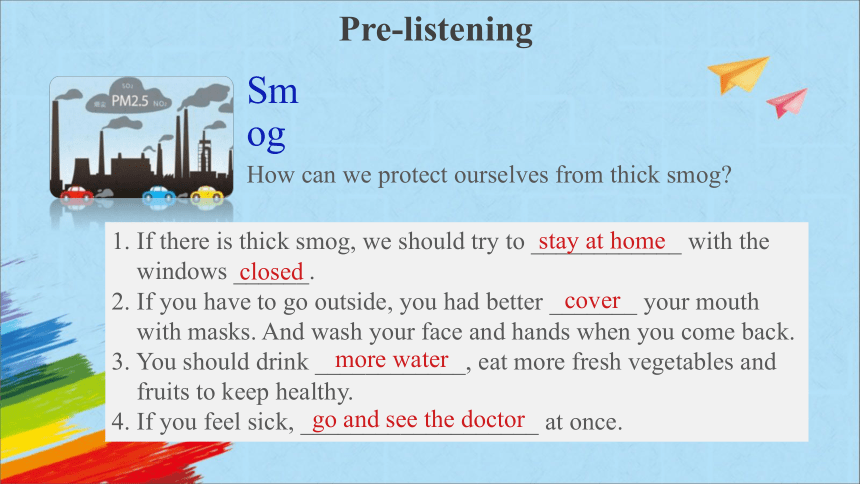
文档简介
(共26张PPT)
Unit 8 Natural disasters
Integrated skills
Task 1
Look at the pictures and know the different dangers.
Fires
Floods
Earthquakes
Traffic accidents
Warming-up
Call for help
Which numbers should we dial
★
★
★
★
110
119
120
122
Police
Fire
Hospital
Traffic
Can you match them
Warming-up
Look and write
Pre-listening
What happened Which telephone numbers should they dial for help
The building is _______.
They should dial _____ for help.
The car hit the tree and two people ____________ in the car.
They should dial ____ for help.
on fire
119
were trapped
122
______________ hit the city and lots of people were hurt.
They should dial _____ for help.
The man stole a purse from the lady’s bag when she was doing shopping.
They should dial ____ for help.
An earthquake
120
110
Pre-listening
Is it right to
try to get out as soon as possible
shout for help all the time
hide in the bath full of water and wait for help
stay low to the ground
The building is on fire.
Fire
Pre-listening
Look and discuss
Traffic accidents
What should we do to protect ourselves from traffic accidents
1. We should always _______________________.
2. It’s better not to ______________, especially
on ________________ days.
3. We shouldn’t _________________ while riding.
follow the traffic rules
ride too fast
rainy or snowy
chat with others
Pre-listening
Smog
How can we protect ourselves from thick smog
1. If there is thick smog, we should try to ____________ with the
windows ______.
2. If you have to go outside, you had better _______ your mouth
with masks. And wash your face and hands when you come back.
3. You should drink ____________, eat more fresh vegetables and
fruits to keep healthy.
4. If you feel sick, ___________________ at once.
stay at home
closed
cover
more water
go and see the doctor
Pre-listening
Earthquake
How can we protect ourselves when an earthquake happens
Pre-listening
1. Don’t be too frightened.
2. Don’t rush out in panic.
3. Hide in the washroom or under the desk.
4. Don’t use the lift.
5. Save energy to survive.
…
Which of the following action is better during a flood
To walk through the water and find
someone to help you.
B. To find a high ground around the
house and wait for help.
Pre-listening
Flood
Listen to the talk and help Simon complete his notes.
While-listening
The students are attending a talk called “Away from danger”.
While-listening
Danger Tips
Fires Try to get out as soon as possible.
Cover your mouth and nose with a wet towel to protect yourself from ____________.
Stay _______ to the ground.
Never ____________ into the building on fire.
Flood Get to ______ ground and stay there.
Do not ______ through the flood water.
thick smoke
low
go back
high
walk
While-listening
Danger Tips
Earthquakes ______ under a strong desk or table to protect yourself.
Do not stand near a __________.
Traffic accidents Always _______ traffic rules.
Look ______, right and then left when you cross the road.
Do not sit, ______ or ride your bicycle on railways.
Hide
window
follow
left
walk
Simon’s cousin Annie is asking Simon about the talk. Help him answer Annie’s questions.
Complete the conversation. Then listen again and check.
While-listening
A: What did you learn from yesterday’s talk, Simon
S: We learnt a lot about keeping ourselves safe from fires, floods,
earthquakes and _______________.
A: Really What should we do if our building is on fire
S: We should try to _______ as soon as possible.
A: How can we protect ourselves from thick smoke
S: We should use a ___________ to cover our mouth and nose and stay
______ to the ground.
traffic accidents
get out
wet towel
low
A: Well, what should we do when there’s a flood
S: We should get to ____________. Remember that we shouldn’t
_______ through the flood water.
A: I see. What should we do when an earthquake happens
S: Hide under a ________ desk or table. Stay away from a _________.
A: What should we do to protect ourselves from traffic accidents
S: We should always follow ___________. Moreover, it’s dangerous to
sit, walk or ride a bicycle on ________.
high ground
walk
strong
window
traffic rules
railways
While-listening
Think about what you learnt from the talk
What phone number to dial
How to keep ourselves safe from …
How to protect ourselves from …
Post-listening
Get to…
Stay…
Walk…
Follow…
Look…
Sit…
Get out…
Cover…
Go back…
Hide…
Stand…
Do’s
Don’ts
Task 2
Sometimes people may get hurt in accidents or disasters. What should we do
Pre-listening
Look and think
Millie and Daniel are talking about first aid.
While-listening
Listen and fill
What should we do first What accident How to deal with it
______ of hands First, _____ the hand ____________ for about _____ minutes.
After that, ______________ with
_____________.
Finally, ___________________.
burn
keep
in cold water
ten
cover the burn
a clean towel
go and see the doctor
Listen and read
M: We may burn our hands when we cook at home. Do
you know what to do first if I burn myself
D: Sure. First, you should keep your hand in cold water
for about ten minutes.
M: I see. What should I do after that
D: Cover the burn with a clean towel.
M: Should I put any cream on it
D: No, you shouldn’t. You should go and see the doctor.
M: All right. Thanks.
Post-listening
Look and talk, then make a dialogue
Accidents How to deal with them
cuts
bites
falls
stop bleeding
cover
(X) wash
look for injury
put ice bag …
(X) move
water & soap
stop bleeding
(X) put cream …
When we play sports/play with pets/cook at home …
Post-listening
A: … may … when we ...
Do you know what to do first
when …
B: Sure. First, you should …
A: I see. What should I do after that
B: …
A: Should I …
B: Yes./No, you shouldn’t. You
should …
A: All right. Thanks a lot.
Never call 110 as a joke or just to see what might happen.
Only when a person is badly hurt or in danger should you call 110.
When you call 110, they can tell where you are calling from. And you will pay for that!
Learn and remember
Post-listening
A: … may … when we …
Do you know what to do first when …
B: Sure. First, you should …
A: I see. What should I do after that
B: …
A: Should I …
B: No, you shouldn’t. You should …
A: All right. Thanks.
Summary
1. Read and recite the dialogue in “Speak up”.
2. Write down a dialogue using the one in “Speak up” as a model.
Homework
Thank you!
Unit 8 Natural disasters
Integrated skills
Task 1
Look at the pictures and know the different dangers.
Fires
Floods
Earthquakes
Traffic accidents
Warming-up
Call for help
Which numbers should we dial
★
★
★
★
110
119
120
122
Police
Fire
Hospital
Traffic
Can you match them
Warming-up
Look and write
Pre-listening
What happened Which telephone numbers should they dial for help
The building is _______.
They should dial _____ for help.
The car hit the tree and two people ____________ in the car.
They should dial ____ for help.
on fire
119
were trapped
122
______________ hit the city and lots of people were hurt.
They should dial _____ for help.
The man stole a purse from the lady’s bag when she was doing shopping.
They should dial ____ for help.
An earthquake
120
110
Pre-listening
Is it right to
try to get out as soon as possible
shout for help all the time
hide in the bath full of water and wait for help
stay low to the ground
The building is on fire.
Fire
Pre-listening
Look and discuss
Traffic accidents
What should we do to protect ourselves from traffic accidents
1. We should always _______________________.
2. It’s better not to ______________, especially
on ________________ days.
3. We shouldn’t _________________ while riding.
follow the traffic rules
ride too fast
rainy or snowy
chat with others
Pre-listening
Smog
How can we protect ourselves from thick smog
1. If there is thick smog, we should try to ____________ with the
windows ______.
2. If you have to go outside, you had better _______ your mouth
with masks. And wash your face and hands when you come back.
3. You should drink ____________, eat more fresh vegetables and
fruits to keep healthy.
4. If you feel sick, ___________________ at once.
stay at home
closed
cover
more water
go and see the doctor
Pre-listening
Earthquake
How can we protect ourselves when an earthquake happens
Pre-listening
1. Don’t be too frightened.
2. Don’t rush out in panic.
3. Hide in the washroom or under the desk.
4. Don’t use the lift.
5. Save energy to survive.
…
Which of the following action is better during a flood
To walk through the water and find
someone to help you.
B. To find a high ground around the
house and wait for help.
Pre-listening
Flood
Listen to the talk and help Simon complete his notes.
While-listening
The students are attending a talk called “Away from danger”.
While-listening
Danger Tips
Fires Try to get out as soon as possible.
Cover your mouth and nose with a wet towel to protect yourself from ____________.
Stay _______ to the ground.
Never ____________ into the building on fire.
Flood Get to ______ ground and stay there.
Do not ______ through the flood water.
thick smoke
low
go back
high
walk
While-listening
Danger Tips
Earthquakes ______ under a strong desk or table to protect yourself.
Do not stand near a __________.
Traffic accidents Always _______ traffic rules.
Look ______, right and then left when you cross the road.
Do not sit, ______ or ride your bicycle on railways.
Hide
window
follow
left
walk
Simon’s cousin Annie is asking Simon about the talk. Help him answer Annie’s questions.
Complete the conversation. Then listen again and check.
While-listening
A: What did you learn from yesterday’s talk, Simon
S: We learnt a lot about keeping ourselves safe from fires, floods,
earthquakes and _______________.
A: Really What should we do if our building is on fire
S: We should try to _______ as soon as possible.
A: How can we protect ourselves from thick smoke
S: We should use a ___________ to cover our mouth and nose and stay
______ to the ground.
traffic accidents
get out
wet towel
low
A: Well, what should we do when there’s a flood
S: We should get to ____________. Remember that we shouldn’t
_______ through the flood water.
A: I see. What should we do when an earthquake happens
S: Hide under a ________ desk or table. Stay away from a _________.
A: What should we do to protect ourselves from traffic accidents
S: We should always follow ___________. Moreover, it’s dangerous to
sit, walk or ride a bicycle on ________.
high ground
walk
strong
window
traffic rules
railways
While-listening
Think about what you learnt from the talk
What phone number to dial
How to keep ourselves safe from …
How to protect ourselves from …
Post-listening
Get to…
Stay…
Walk…
Follow…
Look…
Sit…
Get out…
Cover…
Go back…
Hide…
Stand…
Do’s
Don’ts
Task 2
Sometimes people may get hurt in accidents or disasters. What should we do
Pre-listening
Look and think
Millie and Daniel are talking about first aid.
While-listening
Listen and fill
What should we do first What accident How to deal with it
______ of hands First, _____ the hand ____________ for about _____ minutes.
After that, ______________ with
_____________.
Finally, ___________________.
burn
keep
in cold water
ten
cover the burn
a clean towel
go and see the doctor
Listen and read
M: We may burn our hands when we cook at home. Do
you know what to do first if I burn myself
D: Sure. First, you should keep your hand in cold water
for about ten minutes.
M: I see. What should I do after that
D: Cover the burn with a clean towel.
M: Should I put any cream on it
D: No, you shouldn’t. You should go and see the doctor.
M: All right. Thanks.
Post-listening
Look and talk, then make a dialogue
Accidents How to deal with them
cuts
bites
falls
stop bleeding
cover
(X) wash
look for injury
put ice bag …
(X) move
water & soap
stop bleeding
(X) put cream …
When we play sports/play with pets/cook at home …
Post-listening
A: … may … when we ...
Do you know what to do first
when …
B: Sure. First, you should …
A: I see. What should I do after that
B: …
A: Should I …
B: Yes./No, you shouldn’t. You
should …
A: All right. Thanks a lot.
Never call 110 as a joke or just to see what might happen.
Only when a person is badly hurt or in danger should you call 110.
When you call 110, they can tell where you are calling from. And you will pay for that!
Learn and remember
Post-listening
A: … may … when we …
Do you know what to do first when …
B: Sure. First, you should …
A: I see. What should I do after that
B: …
A: Should I …
B: No, you shouldn’t. You should …
A: All right. Thanks.
Summary
1. Read and recite the dialogue in “Speak up”.
2. Write down a dialogue using the one in “Speak up” as a model.
Homework
Thank you!
